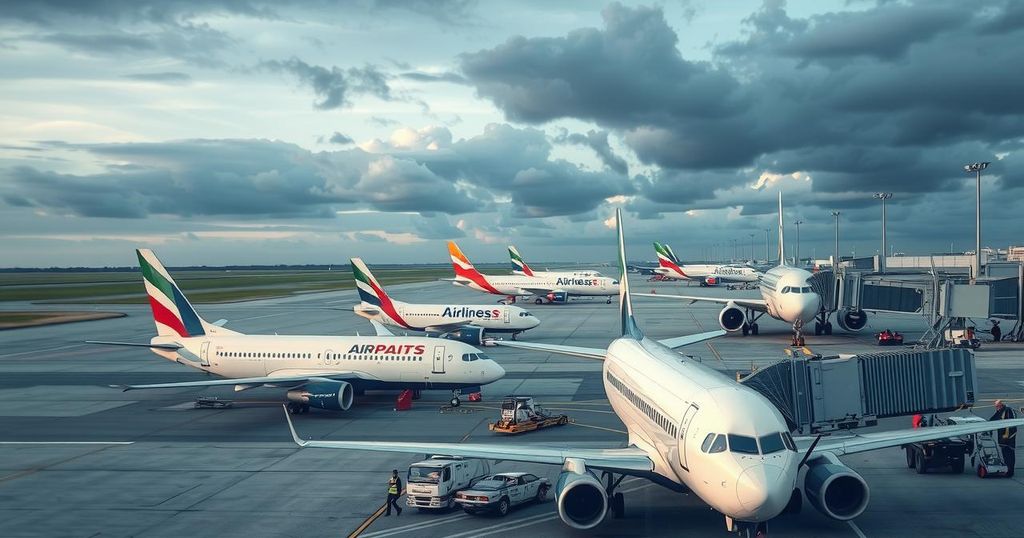Global Flight Chaos Amid Iran-Israel Conflict Escalation

Global airlines are facing major disruptions due to the escalating conflict between Israel and Iran, with numerous flights suspended or significantly delayed. This chaos follows U.S. airstrikes on Iranian nuclear facilities, which prompted retaliatory missile strikes. Various airlines, including Qatar Airways and Virgin Australia, have adjusted their operations in response to airspace closures, urging travelers to stay informed and remain patient during this turbulent period.
Travelers worldwide are facing significant disruption as numerous airlines suspend or reduce flights due to the escalating conflict between Israel and Iran. This turbulence in the aviation sector follows recent U.S. airstrikes on Iranian nuclear facilities over the weekend, which has led to Iran retaliating with missile attacks. In short, the airline industry is currently in turmoil with various flight cancellations and delays, especially for those connecting through the Middle East.
The situation has worsened under growing tensions, with Iran’s Revolutionary Guard recently confirming missile strikes targeting a U.S. airbase in Qatar, dubbed the “Operation Besharat al-Faith.” As of Monday, reports indicated that former U.S. President Donald Trump stated a ceasefire was reached between Iran and Israel; however, Iranian officials refuted this claim, complicating the situation further for airlines and passengers alike.
In response to the airspace closure in Qatar, operations at Dubai Airports briefly stalled but have since resumed, and the safety of travelers remains a priority. The General Civil Aviation Authority praised the cooperation across various sectors to maintain air traffic safety despite tumultuous conditions. However, the impact on Doha’s Hamad International Airport was notable, with 13% of flights canceled and 65% delayed.
Qatar Airways, which handles a vast network, has started resuming flights but warned passengers to expect substantial delays. They released a message emphasizing their commitment to passenger safety and assistance during this critical time, stating they were working closely with authorities to restore full operations.
Meanwhile, Virgin Australia confirmed that two of its flights, operated by Qatar Airways, had to be diverted due to airspace restrictions, ensuring all guests have landed safely. Likewise, Qantas encountered issues with diverted flights as they navigated the restricted airspace, advising patience as they adapt to ongoing changes. The airline’s operational teams remain vigilant in assessing airspace conditions.
Emirates has made adjustments to its flight paths as well, ensuring scheduled operations while monitoring risks closely. Although no flights to Iran and Iraq will operate until further notice, the airline is taking precautions to keep services running with minimal disruption. In a similar vein, Singapore Airlines announced the cancellation of several flights due to these unfolding events, assuring affected customers of alternative arrangements or refunds.
Various other global airlines, including British Airways and Turkish Airlines, have also taken safety measures, leading to the suspension of some routes. The uncertainties surrounding the region continue to escalate as flights are being modified or halted altogether based on safety assessments.
Amidst these changes, travel insurance rates are set to rise. Experts suggest that potential travelers should pay closer attention to the evolving conflict in the Middle East, as the risk levels will likely influence their insurance premiums and coverage options. Some insurance providers might impose certain exclusions if covers are purchased after advisory levels increase.
In light of these developments, Australian officials have advised travelers not to cancel their flights unnecessarily and to stay vigilant regarding travel restrictions. The current climate is undeniably unsettling but experts emphasize the importance of remaining informed and adaptable. Those traveling over the coming weeks should monitor their flight information closely and allow airlines the opportunity to manage the evolving situation.
Overall, though the airline industry is facing a wave of disruptions in light of the Israel-Iran conflict, communications, and contingency plans from major airlines aim to minimize passenger effects while ensuring safety is paramount. Travelers are urged not to panic, to remain patient, and to follow their airlines’ guidance in navigating these challenging times.
In summary, the conflict between Israel and Iran has caused widespread flight disruptions, urging many airlines to suspend or alter services. With the U.S. involvement in airstrikes and Iran’s subsequent missile actions, the aviation sector has been thrown into chaos. Passengers are advised to stay updated on their flight statuses and not to cancel their plans unnecessarily, as airlines work to accommodate travelers amid ongoing tensions in the region. Safety remains the top priority for carriers as they navigate these turbulent waters.
Original Source: www.news.com.au








